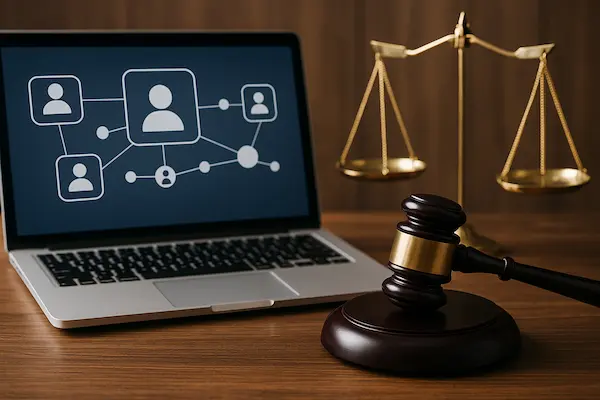
WHAT IS CONSIDERED SEXUAL CONTACT THROUGH DIGITAL MEANS?
Under Bolivian law, any adult who attempts to arrange a sexual encounter or seeks to obtain sexual or erotic images, videos, or other content from a minor using digital platforms—such as social media, messaging apps, online games, or email—is committing a crime if they act through deceit, manipulation, or by exploiting the trust of the minor.
The offense does not require that the sexual act or the transfer of content actually occur. It is sufficient that the contact be established with an explicit or implicit sexual intent, using any technological means to communicate with the underage individual.
AGGRAVATING CIRCUMSTANCES IN DIGITAL SEXUAL CONTACT WITH MINORS
The law provides for an increase of one-third in the penalty if certain aggravating circumstances are present. These include:
MINOR WITH A DISABILITY OR FROM AN INDIGENOUS COMMUNITY
If the child or adolescent has a disability or belongs to an Indigenous, native, or peasant community, the penalty will be more severe. This aggravating factor acknowledges the particular vulnerability of these groups to digital manipulation.
OFFENDER IN A RELIGIOUS OR EDUCATIONAL ROLE
The offense is considered more serious when committed by a religious authority, spiritual leader, or faith community guide. Penalties also increase if the offender is part of the educational system, whether as a teacher, administrator, or support staff, regardless of the educational level or modality.
MULTIPLE VICTIMS
Targeting more than one minor—either simultaneously or successively—for sexual purposes also constitutes an aggravating circumstance. This provision aims to penalize repeated and premeditated criminal behavior more severely.
EXAMPLES OF DIGITAL OFFENSES AGAINST MINORS
- Case 1: An adult man creates a fake social media profile to gain the trust of a 13-year-old girl. After weeks of chatting, he requests intimate photos. Even though the minor does not comply, the very act of contacting her with such intent constitutes a crime.
- Case 2: A female teacher maintains regular contact with a group of male students via a messaging app. One of the adolescents reports that she invited him to meet outside of school “to talk about personal matters” and sent him sexually suggestive messages. Due to the teacher’s position of authority, this contact may involve an aggravating circumstance.
- Case 3: A spiritual leader sends private erotic messages to several boys in an Indigenous community and persuades them to send him compromising images. This case involves multiple aggravating factors: the minors’ status, the offender’s position of authority, and the contact with multiple victims.
CONCLUSION
Article 312 Quinquies of the Bolivian Penal Code imposes severe penalties for contacting minors through digital means for sexual purposes. Physical abuse or actual materialization of the act is not required for the offense to be established. The mere act of making contact with such intent—especially through manipulation, deceit, or breach of trust—is sufficient to initiate criminal proceedings. Penalties are significantly increased when the offender holds a position of power or the victim is particularly vulnerable.
Our law firm provides specialized legal services in cybercrime and child and adolescent protection. If you are facing a similar situation or require legal advice, do not hesitate to contact our professional team.
Frequently Asked Questions (FAQs)
What is considered information technology in this context?
It includes social media platforms, email, messaging applications, online gaming platforms, and any other digital communication channel.
Is the offense established even without a physical meeting?
Yes. The crime is configured by the mere act of making sexual contact using deceit or manipulation, even if no physical meeting takes place.
Are adolescents over the age of 14 also protected by this law?
Yes. Any person under the age of 18 is protected under this legal provision.
Can the offense be reported even if no images or videos were sent?
Yes. Intent and manipulative contact alone are sufficient to constitute the offense.
What should a parent do if they discover this kind of contact with their child?
They should collect all digital evidence (messages, screenshots) and immediately report the matter to the Prosecutor’s Office or consult a specialized attorney to initiate a formal complaint.
The content of this article does not reflect the technical opinion of Rigoberto Paredes & Associates and should not be considered a substitute for legal advice. The information presented herein corresponds to the date of publication and may be outdated at the time of reading. Rigoberto Paredes & Associates assumes no responsibility for keeping the information in this article up to date, as legal regulations may change over time.



